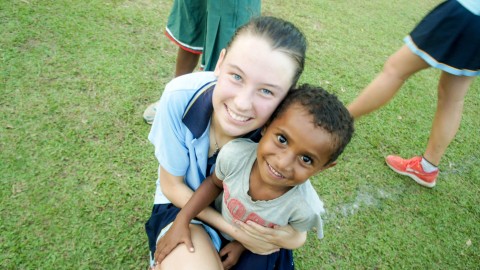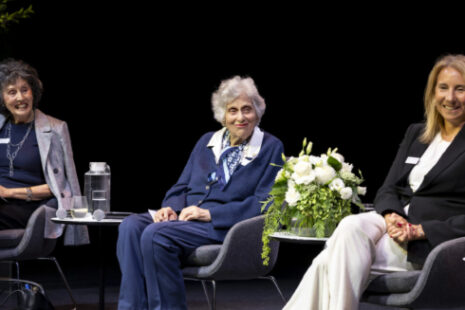The Resilience Project

A resilience seminar held at School highlights the importance of cultivating positive emotions as a means to achieving psychological growth and improved wellbeing of students over time.
The feedback received from parents attending the St Catherine’s Parent Seminar has been overwhelmingly positive. Mr Hugh van Cuylenburg, Founding Director of The Resilience Project, provided an honest, warm and engaging Address about the wellbeing of Australian youth.
Following a year teaching in the far north of India, volunteering and living at an underprivileged school in the Himalayas, Mr van Cuylenburg discovered what he believes to be resilience in its purest form. Inspired by this experience (and subsequent trips to Bangladesh and Sri Lanka), Hugh returned to Melbourne and commenced post graduate study in mental illness.
He cites research suggesting that one in four adolescents will develop some form of mental illness. For girls, the research is revealing one in three girls suffer from an anxiety disorder (one in five for boys), a statistic that The Resilience Project are working hard to address. The research also highlights that combined with high rates of poor mental health, even more worrying is the trend that 65% of adolescents do not seek help for mental illness.
Mr van Cuylenburg’s work is built on the research of Dr Barbara Fredriksen’s (Positive Emotions and Psychophysiology Lab at the University of North Carolina, Chapel Hill.) Her work identifies that positive emotion builds our cognitive capacity – when we are experiencing positive emotion, we are the very best version of ourselves. This is experienced by demonstrating: broader attention spans, greater working memory, enhanced verbal fluency, increased openness to information, increased creativity and increased engagement. Positive emotions are considered to serve as markers of flourishing, or optimal wellbeing. Moreover, they do so not simply within the pleasant moment, but over the long term as well.
The take-home message for our parents was that positive emotions are worth cultivating, not just as end states in themselves but also as a means to achieving psychological growth and improved wellbeing over time.
Parents were provided some practical strategies during the Seminar to create positive emotions that strive to build students’ resilience and, ultimately, works towards an inoculation against mental illness. By educating parents on these practical strategies, parents will also be able to support the development of a resilient child. The Seminar also explored the concepts of gratitude, empathy, emotional literacy and mindfulness.
Many of these strategies are already adopted within our weThrive: Wellbeing@St Catherine’s program and include teaching students in both Junior and Senior School mindfulness techniques, a focus on practising gratitude and an opportunity to write three things that went well during the day or writing three things we feel grateful for in a 21 day journal and practising empathy and daily kindness.
Mr van Cuylenburg cited evidence to suggest that every time we do something kind for someone else, our brain releases oxytocin, leading to increased self-esteem and confidence, increased energy, increased levels of happiness and increased levels of positivity.
Our Year 9 Heyington to Highlands program is also founded through a need for adolescents to explore and understand gratitude and empathy. Like The Resilience Project’s work in developing countries, working with the children and communities in the highlands of Fiji, our girls reconcile what one needs to actually feel happiness, and they witness gratitude in its simplest form. Further information about The Resilience Project can be found here. Please visit the mystcatherines Student Wellbeing page to view the Presentation Power Point and links to the mindfulness apps.





